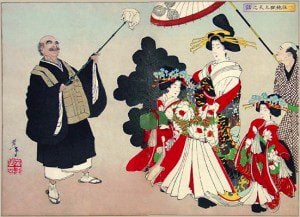The Venerable Bhikkhu Bodhi, an American Buddhist monk and scholar, increasingly known for his social activism wrote a very interesting meditation, Facing the Great Divide, where he attempts to define and contrast what he calls “classical” and “secular” Buddhism.
While at the extremes I would agree there is indeed a divide, and probably unbridgeable, I would offer that at least in some ways these views are more like poles expressing the extremes of contemporary Buddhism, particularly as it is experienced in the West, and that experience is more along the lines of a continuum with the bhikkhu’s descriptions mostly concerned with the farthest reaches.
He outlines the whole reason for being or doing Buddhism, what might be best called the soteriological point pretty carefully. He says for the classical Buddhist the goal is “the end of dukkha, is release from the round of rebirths, the attainment of an unconditioned dimension of spiritual freedom called nibbāna.” And therefore, “The practice of the path is intended to eradicate the bonds tying us to the round of rebirths and thereby bring liberation from repeated birth, ageing and death.” The point for the secular Buddhist is a bit more tenuous, although it clearly “starts from our immediate existential situation, understood without bringing in non-naturalistic assumptions.” With this rebirth ceases to be the problem, and instead, and here is where it gets vague, samsara becomes “a metaphor depicting our ordinary condition of bewilderment and addictive pursuits.” And with that the goal largely becomes “a tentative, ever-fragile freedom from distress in this present life itself.”
There’s a lot to this.
However, I am specifically a Zen Buddhist, and for me the condition of awakening is the primary goal. I see it all happening within the realm of the natural, and am uncomfortable introducing any supernatural elements to it, so on the one hand I could be cast with the “secular.” But I also see no contradiction between my actual lived experience and what is described within the Zen literature. Well, with one exception. I find the assertions of once and forever enlightenment is in fact more tentative, more fragile, more dynamic, in and out. But, even that, I suggest, is more in accord with the deeper pointing of my tradition than not.
Zen emerges in early Medieval China and the spiritual literature which I find most compelling comes from that time, and from that time with the various commentaries and newer insights into that basic insight into awakening, itself reducable to that line from the Heart Sutra, “form is emptiness, emptiness is form.” And for those who don’t quite get it, with the following line “form is exactly emptiness, emptiness is exactly form.” I gather some scholars suggest the Heart Sutra, or at least goodly parts of it were in fact composed in early Medieval China, and then translated back into the Sanskrit we’ve assumed was the original.
This is all part of a view of “original awakening,” where we are not looking at something achieved over time through stages, but which is actually right here, and right now, and we need only wake up to it.
And it is this insight that samsara is nirvana, that the ordinary world is awakening is the soteriological project I am concerned with.
Now, I start from the assumption it can be understood entirely without reference to any supernatural, but there’s a lot of “not knowing” in this project, wild openness, and so I try hard, with a tip of the hat to Bhikkhu Bodhi’s caution, to remain open to the possibility it has other dimensions beyond this obvious one we live and die within. But, and this is important for me personally, it need not be anything other than natural. The not knowing is the important part. Not “not knowing” as in being open to any idea however unlikely, but not knowing as an existential state of openness to what is.
Whether this experience can be contained within our current definitions of “psychological,” I cannot say. But, I am inclined to say not. Rather here is where we seem best served by religious or spiritual language for the pointing. Always recalling the words themselves are pointing, not the thing in itself. (Except when they are – there is always, always that form is emptiness, emptiness is form: and so, word as form is also word as emptiness…) But functionally, the words are pointing us along.
To our awakening.
So, the realizations I’ve come to are not about feeling a little better, but are instead life transforming, reorienting how I understand myself and my relationship with the rest of this poor, broken, suffering, joyful, most amazing world.
Now awake. Now not.
Awakening as an endless project. I am me. And I am you. And it means something, sometimes understood more truly, sometimes not, dynamic, wildly open.
Awakening to this I find my life changed from when I thought I was isolated, period.
And with this I engage the practices of my tradition, zazen and koan introspection.
Each a pointer. Each an invitation.
Classical? Secular?
I cannot say.













